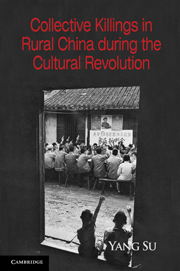The violence of Mao's China is well known, but its extreme form is not. In 1967 and 1968, during the Cultural Revolution, collective killings were widespread in rural China in the form of pubic execution. Victims included women, children, and the elderly. This book is the first to systematically document and analyze these atrocities, drawing data from local archives, government documents, and interviews with survivors in two southern provinces. This book extracts from the Chinese case lessons that challenge the prevailing models of genocide and mass killings and contributes to the historiography of the Cultural Revolution, in which scholarship has mainly focused on events in urban areas.
Contents
1. Kill thy neighbor; 2. On the record; 3. Community and culture; 4. Class enemies; 5. Mao's ordinary men; 6. Demobilizing law; 7. Framing war; 8. Patterns of killing; 9. Understanding atrocities in plain sight.
Prize Winner
Winner, 2012 Barrington Moore Book Award, Section on Comparative and Historical Sociology, American Sociological Association
Honorable Mention, 2012 Charles Tilly Award, Section on Collective Behavior and Social Movements, American Sociological Association
Reviews
“This is a truly terrific book, and long overdue too, leaving behind the well-trodden ground of the Red Guards in Beijing to focus unflinchingly on the horror of mass killings in the countryside. Yang Su has written a model of rigorous scholarship that squarely places the Cultural Revolution where it should have been all along, in the area of genocide studies on a par with Rwanda, as villagers turned against villagers, slaughtering each other in the hundreds of thousands.”
—Frank Dikotter, University of Hong Kong, author of Mao’s Great Famine
“Theoretically, this book is the first attempt showing that the development of modern genocide is not only shaped by the ideologically charged nation state, but also by the local actors and structural forces in ways quite unintended by the state actors. Empirically, this book reminds us once again that the Chinese Cultural Revolution (1966-1976) is one of the greatest tragedies of the modern world. It also turns our attention from the dynamics of the Cultural Revolution in China’s urban settings to the less known stories in rural areas. This book will be on our shelves as an outstanding work in the study of the Cultural Revolution and the politics of the Chinese communist regime, genocide study, and social movement research.”
—Dingxin Zhao, The University of Chicago
"Su tells a heart-rendering story and contributes new insights to the burgeoning academic literature on contentious politics and genocide."
— Andrew J. Nathan, Foreign Affairs
"Yang Su deserves great credit for uncovering the collective killings and for his penetrating analysis of their multiple causes"Jeremy Brown, Simon Fraser University, H-Net Reviews

